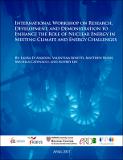| dc.contributor.author | Anadon, Laura Diaz | |
| dc.contributor.author | Bosetti, Valentina | |
| dc.contributor.author | Bunn, Matthew G. | |
| dc.contributor.author | Catenacci, Michela | |
| dc.contributor.author | Lee, Audrey | |
| dc.date.accessioned | 2012-02-13T20:39:29Z | |
| dc.date.issued | 2011 | |
| dc.identifier.citation | Anadon, Laura D., Valentina Bosetti, Matthew Bunn, Michela Catenacci, and Audrey Lee. 2011. International Workshop on Research, Development, and Demonstration to Enhance the Role of Nuclear Energy in Meeting Climate and Energy Challenges. Cambridge, Mass.: Report for Energy Technology Innovation Policy research group, Belfer Center for Science and International Affairs, Harvard Kennedy School, ICARUS Project, Fondazione Eni Enrico Mattei, and International Center for Climate Governance. | en_US |
| dc.identifier.uri | http://nrs.harvard.edu/urn-3:HUL.InstRepos:8160715 | |
| dc.description.abstract | Dramatic growth in nuclear energy would be required for nuclear power to provide a significant part of the carbon-free energy the world is likely to need in the 21st century, or a major part in meeting other energy challenges. This would require increased support from governments, utilities, and publics around the world. Achieving that support is likely to require improved economics and major progress toward resolving issues of nuclear safety, proliferation-resistance, and nuclear waste management. This is likely to require both research, development, and demonstration (RD&D) of improved technologies and new policy approaches.
To gather information on the RD&D needs for the future of nuclear energy, the future cost and performance of nuclear technologies, and on the major barriers to large-scale deployment of nuclear energy, a team of researchers at Harvard University and the Fondazione Eni Enrico Mattei (FEEM) conducted two coordinated surveys of nuclear experts. The surveys asked experts how much they would recommend that their governments spend on nuclear energy RD&D; what progress in cost and performance might be expected by 2030 if those recommendations were followed; and what other factors might constrain or promote future nuclear energy growth. Leading experts from the United States (U.S.) and the European Union (E.U.) participated in this expert elicitation surveys during the summer and fall of 2010. In April 2011, the FEEM and Harvard teams held a workshop in Venice, Italy with a subset of the participating E.U. and U.S. experts to present and discuss the results of the elicitations, in an effort to understand where there is consensus and where the most important disputes and uncertainties lie. Given the Fukushima nuclear accident in Japan, the meeting opened with a discussion of the significance of that event for the future of nuclear power, and of the main lessons learned. | en_US |
| dc.language.iso | en_US | en_US |
| dc.publisher | Belfer Center for Science and International Affairs, Harvard Kennedy School | en_US |
| dc.relation.isversionof | http://belfercenter.ksg.harvard.edu/publication/21106/international_workshop_on_research_development_and_demonstration_to_enhance_the_role_of_nuclear_energy_in_meeting_climate_and_energy_challenges.html | en_US |
| dc.relation.hasversion | http://web.hks.harvard.edu/publications/citation.aspx?PubId=7862 | en_US |
| dash.license | LAA | |
| dc.subject | IGA - International Global Affairs | en_US |
| dc.subject | Science and Technology | en_US |
| dc.subject | Climate Change | en_US |
| dc.subject | Energy | en_US |
| dc.subject | Nuclear Non-proliferation | en_US |
| dc.title | International Workshop on Research, Development, and Demonstration to Enhance the Role of Nuclear Energy in Meeting Climate and Energy Challenges | en_US |
| dc.type | Research Paper or Report | en_US |
| dc.description.version | Version of Record | en_US |
| dc.relation.journal | Energy Technology Innovation Policy Research Group Report | en_US |
| dash.depositing.author | Bunn, Matthew G. | |
| dc.date.available | 2012-02-13T20:39:29Z | |
| dash.contributor.affiliated | Bunn, Matthew | |


